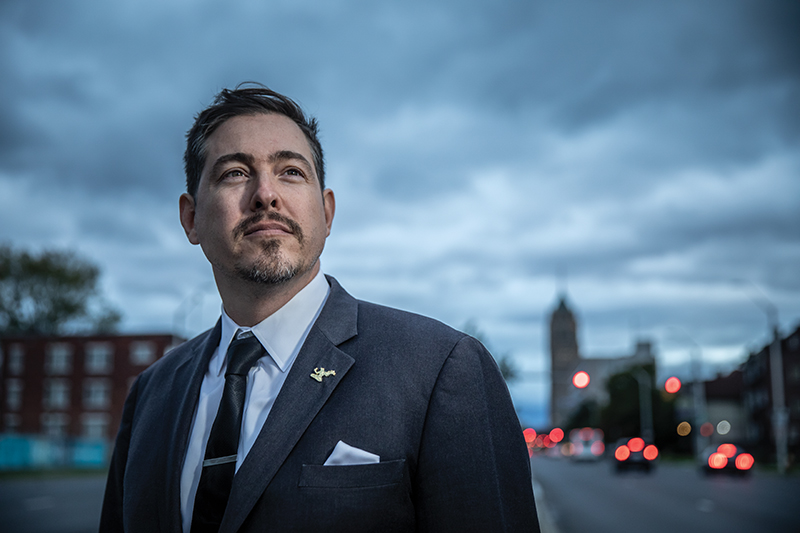
The October evening concludes with a loud, festive, Motown-themed reception on the riverfront, the first event at the new Robert C. Valade Park. And Adrian Tonon, true to his reputation, seems to be everywhere at once: a firm handshake here, an arm around the shoulder there, an intimate conversation, a whispered aside. When someone mentions the soir├®e was organized by Tonon, DetroitŌĆÖs first 24-hour economy ambassador, Harry LaRosiliere, mayor of Plano, Texas, is instantly intrigued.╠²
ŌĆ£Can you point him out to me, please?ŌĆØ the mayor asks. ŌĆ£IŌĆÖve never heard of anyone with a title like that before.ŌĆØ
HeŌĆÖs not alone. Most Detroiters donŌĆÖt know they have an official nabob of the night, appointed last year by Mayor Mike Duggan, much less what TononŌĆÖs duties entail. As this Detroit Country Day and Michigan State alum views it, his tasks are multifold: to sustain the cityŌĆÖs resurgence by making Detroit a welcoming and supportive community for creatives of all kinds; to serve as liaison between its food and entertainment businesses ŌĆö particularly those operating from 6 p.m. to 6 a.m. ŌĆö developers, city agencies, and the public; and to help realize the vision of Detroit becoming a true ŌĆ£24-hour economy.ŌĆØ╠²
So, while his title may spark images of some City Hall-sanctioned, club-hopping party poobah, Tonon is quick to note his job isnŌĆÖt all fun and Greektown flames.
ŌĆ£HereŌĆÖs what I want to make very clear: ItŌĆÖs not about the party,ŌĆØ he says. ŌĆ£For example, if you want to see a true 24-hour economy, go to Henry Ford Hospital. When the doctors, the nurses, the janitors get off at five or six in the morning, is there a restaurant to go to? A dry cleaner they can use? A grocery store? Or the people who work in automotive and in the factories all night? They all want quality of life. So thatŌĆÖs really what itŌĆÖs about. ItŌĆÖs also to assure, hopefully, that your city ╗Õ┤Ū▒▓§▓įŌĆÖt lose its mojo. ThatŌĆÖs what I feel my primary function is.ŌĆØ
Historically, artists, musicians, and other creatives and the venues where they can perform and unwind have been essential to maintaining a cityŌĆÖs mojo, especially one as traditionally talent-rich as Detroit. But theyŌĆÖre often the first to be uprooted by development when a city begins to thrive. ŌĆ£And cities that have displaced their creative community, now theyŌĆÖre begging for them to come back,ŌĆØ Tonon observes.
The ideal, he says, is to make sure that Detroit is inclusive. ŌĆ£You need more places for people to live, but you build residential in neighborhoods where thereŌĆÖs already an organic culture,ŌĆØ he explains. ŌĆ£Music plays late, someone buys a $300,000 condo across the street and says, ŌĆśTurn that music down! I canŌĆÖt sleep at night!ŌĆÖ But that musicŌĆÖs been there for 30 years.╠²
ŌĆ£We have to be respectful of those who invest in our city ŌĆö the developers ŌĆö but they have to know theyŌĆÖre the change agent. WeŌĆÖre getting better as a city at saying, ŌĆśHey, developer, thereŌĆÖs this music venue, this cultural asset, across the street. How do we work together?ŌĆÖ Do you gauge your windows differently? Help the club soundproof its building? Because the club is what makes your neighborhood cool. And nine out of 10 developers get that.ŌĆØ
Tonon isnŌĆÖt the nationŌĆÖs first nighttime economy champion: New York City and Washington, D.C., for instance, created similar positions years ago. The concept of a ŌĆ£night mayorŌĆØ has long existed in Europe. Yet this year, Tonon has delivered a keynote address in Sydney and presented PowerPoints in Stockholm as the unique nature of his role in AmericaŌĆÖs Comeback City has attracted global attention.
HeŌĆÖs perfectly suited to the task. Tonon learned the fundamentals of customer service and hospitality as a reluctant child laborer in his familyŌĆÖs restaurant, RinaŌĆÖs of Detroit, on the cityŌĆÖs west side. Later he joined his parents, Adriano and Rina, at their award-winning Caf├® Cortina in Farmington Hills. Meanwhile, growing up with his ŌĆ£second family,ŌĆØ Dennis and Trudy DunCombe Archer and their sons, instilled a passion for public service.
ŌĆ£Dennis [Jr.] and Vincent are two of my best friends,ŌĆØ Tonon says of the former Detroit mayorŌĆÖs sons. ŌĆ£IŌĆÖve always been very close to my family, but they took me in when I was a kid. I feel I got the desire to embrace mankind from my parents, who are very community minded, but I got the political bug from being around the Archers all the time.
ŌĆ£But IŌĆÖll say this,ŌĆØ he adds, ŌĆ£You donŌĆÖt choose it. It chooses you.ŌĆØ

Tonon also knows the entertainment side of the nightlife equation as co-founder of the Detroit Music Foundation and an entrepreneur who owns his own record label, Sick Em Records, co-founded with Detroit-based hip-hop artist Kid Vishis. But when Duggan announced his candidacy for mayor in 2013, the political bug chomped Tonon hard; he sought out Duggan to join his campaign team. The new mayor subsequently named him DetroitŌĆÖs founding director of customer service, a title he still holds today.
ŌĆ£W│¾▓╣│┘ ╗Õ┤Ū▒▓§▓įŌĆÖt Adrian do for the city?ŌĆØ marvels Rochelle Riley, journalist and DetroitŌĆÖs director of arts and culture, whose mission frequently intertwines with TononŌĆÖs. ŌĆ£As director of customer service, he never met a problem he couldnŌĆÖt solve, and as 24-hour economy ambassador he is a vital bridge between city government, entertainers, and venues across the city. He has proved invaluable to me as we work to ensure the success of DetroitŌĆÖs artists and arts organizations.ŌĆØ╠²
Tonon works for ŌĆö and alongside ŌĆö the mayorŌĆÖs chief of staff, Alexis Wiley. ŌĆ£I think the 24-hour economy is a huge part of our future,ŌĆØ Wiley says. ŌĆ£For me, itŌĆÖs supporting what he does and making sure when people come to Detroit, they feel they get the support they need. That ╗Õ┤Ū▒▓§▓įŌĆÖt happen in a lot of cities, and it hasnŌĆÖt happened a lot in Detroit. WeŌĆÖre trying to change that.ŌĆØ
Indeed, on a night that both Tonon and his young assistant, Jabari Jefferson, describe as ŌĆ£typical,ŌĆØ the 24-hour man will be part diplomat, part negotiator, part advocate ŌĆ” just like any other ambassador. After closing down the Conference of Mayors event, Tonon:╠²
ŌĆó╠² Races into the Rattlesnake Club to meet and greet Michelle M├╝ntefering, German minister of state at the Federal Foreign Office. Tonon was to be part of the dinner party for the visiting M├╝ntefering, but the mayorsŌĆÖ party took precedence.
ŌĆó╠² Stops by a Congress Street nightspot to commiserate with the owner, whose business is being severely disrupted by a private construction firm that has ripped up the streets around him. Tonon promises to review construction permits and do what he can.╠²
ŌĆó╠² Jumps into the Townhouse Detroit restaurant to surprise assistant general manager Bryan Moody with a City of Detroit Certificate of Recognition praising him for his ŌĆ£excellent customer service and continued work as a leader in strengthening our workplaces.ŌĆØ╠²
ŌĆó╠² Drives through several Detroit entertainment districts, monitoring the noise levels with a decibel meter app on his phone. In Greektown, he checks in with a number of business owners whom he helped form a coalition to work with Detroit Police to reduce the street incidents that have beset the district in recent years. ŌĆ£We decided it was time to do something more unified and proactive,ŌĆØ says Yanni Dionisopoulos, owner of the Golden Fleece restaurant and co-owner of Exodus Rooftop Lounge.
His assistant, Jefferson, a Detroit native and Henry Ford Community College freshman, has been so inspired watching Tonon at work that he plans to pursue a political science degree and bring his knowledge back to his hometown.╠²
ŌĆ£HeŌĆÖs a one-in-a-million guy,ŌĆØ Jefferson says, out of TononŌĆÖs earshot. ŌĆ£Everything he knows about public service, about hospitality. IŌĆÖd say heŌĆÖs one of hardest workers in our city government, no bias.ŌĆØ╠²
Tonon admits he ╗Õ┤Ū▒▓§▓įŌĆÖt know how long he can maintain his nonstop pace, especially as the father of four, but for now, he finds his job too fascinating to leave. ŌĆ£YouŌĆÖre inspired by the work,ŌĆØ he says, ŌĆ£and I donŌĆÖt take it for granted.ŌĆØ
But glamorous? Not always.╠²
ŌĆ£Sleeping has become like a job,ŌĆØ Tonon laments. ŌĆ£I have to schedule it. The other night I said, ŌĆśYouŌĆÖve got to be in bed by this time,ŌĆÖ and by the time I got home I missed my window. I slept in my suit that night.ŌĆØ╠²
|
| ╠² |
|











